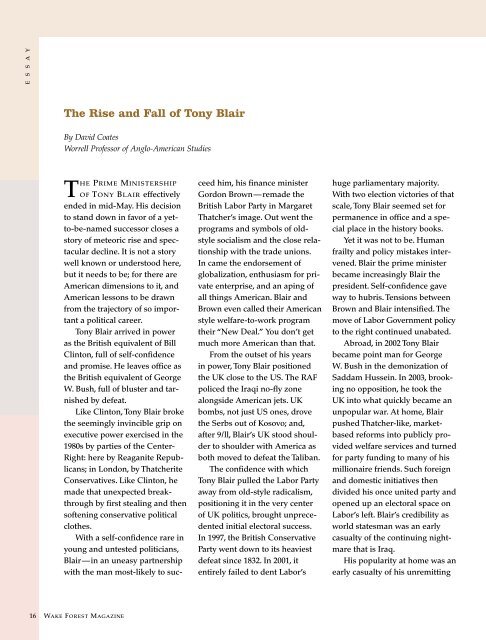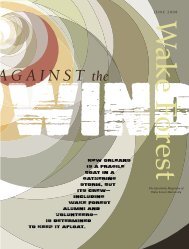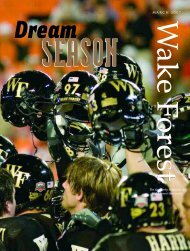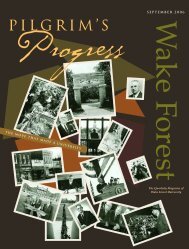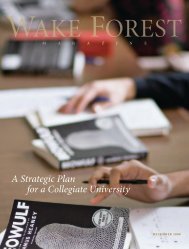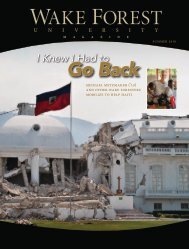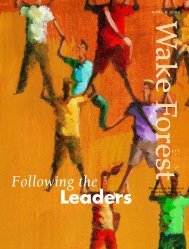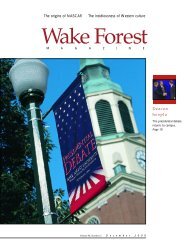Wake Forest Magazine, March 2007 - Past Issues - Wake Forest ...
Wake Forest Magazine, March 2007 - Past Issues - Wake Forest ...
Wake Forest Magazine, March 2007 - Past Issues - Wake Forest ...
- No tags were found...
Create successful ePaper yourself
Turn your PDF publications into a flip-book with our unique Google optimized e-Paper software.
E S S A YThe Rise and Fall of Tony BlairBy David CoatesWorrell Professor of Anglo-American StudiesTHE PRIME MINISTERSHIPOF TONY BLAIR effectivelyended in mid-May. His decisionto stand down in favor of a yetto-be-namedsuccessor closes astory of meteoric rise and spectaculardecline. It is not a storywell known or understood here,but it needs to be; for there areAmerican dimensions to it, andAmerican lessons to be drawnfrom the trajectory of so importanta political career.Tony Blair arrived in poweras the British equivalent of BillClinton, full of self-confidenceand promise. He leaves office asthe British equivalent of GeorgeW. Bush, full of bluster and tarnishedby defeat.Like Clinton, Tony Blair brokethe seemingly invincible grip onexecutive power exercised in the1980s by parties of the Center-Right: here by Reaganite Republicans;in London, by ThatcheriteConservatives. Like Clinton, hemade that unexpected breakthroughby first stealing and thensoftening conservative politicalclothes.With a self-confidence rare inyoung and untested politicians,Blair—in an uneasy partnershipwith the man most-likely to succeedhim, his finance ministerGordon Brown—remade theBritish Labor Party in MargaretThatcher’s image. Out went theprograms and symbols of oldstylesocialism and the close relationshipwith the trade unions.In came the endorsement ofglobalization, enthusiasm for privateenterprise, and an aping ofall things American. Blair andBrown even called their Americanstyle welfare-to-work programtheir “New Deal.” You don’t getmuch more American than that.From the outset of his yearsin power, Tony Blair positionedthe UK close to the US. The RAFpoliced the Iraqi no-fly zonealongside American jets. UKbombs, not just US ones, drovethe Serbs out of Kosovo; and,after 9/ll, Blair’s UK stood shoulderto shoulder with America asboth moved to defeat the Taliban.The confidence with whichTony Blair pulled the Labor Partyaway from old-style radicalism,positioning it in the very centerof UK politics, brought unprecedentedinitial electoral success.In 1997, the British ConservativeParty went down to its heaviestdefeat since 1832. In 2001, itentirely failed to dent Labor’shuge parliamentary majority.With two election victories of thatscale, Tony Blair seemed set forpermanence in office and a specialplace in the history books.Yet it was not to be. Humanfrailty and policy mistakes intervened.Blair the prime ministerbecame increasingly Blair thepresident. Self-confidence gaveway to hubris. Tensions betweenBrown and Blair intensified. Themove of Labor Government policyto the right continued unabated.Abroad, in 2002 Tony Blairbecame point man for GeorgeW. Bush in the demonization ofSaddam Hussein. In 2003, brookingno opposition, he took theUK into what quickly became anunpopular war. At home, Blairpushed Thatcher-like, marketbasedreforms into publicly providedwelfare services and turnedfor party funding to many of hismillionaire friends. Such foreignand domestic initiatives thendivided his once united party andopened up an electoral space onLabor’s left. Blair’s credibility asworld statesman was an earlycasualty of the continuing nightmarethat is Iraq.His popularity at home was anearly casualty of his unremitting16 WAKE FOREST MAGAZINE


